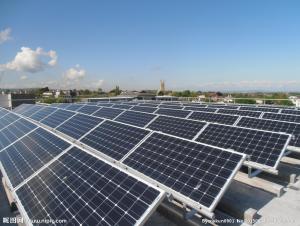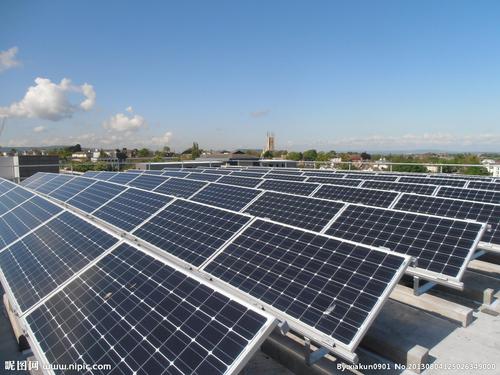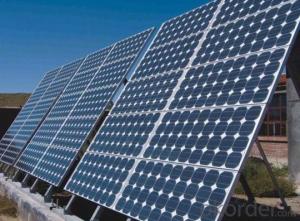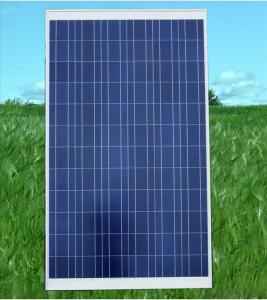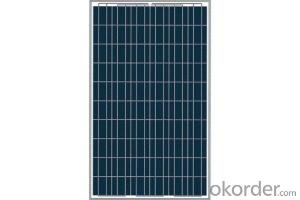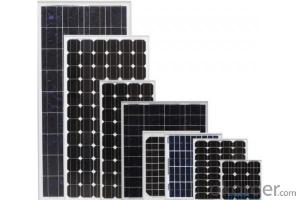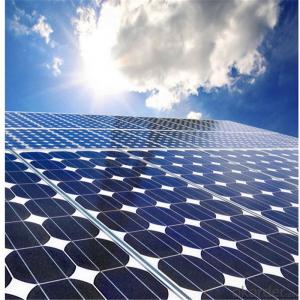Merlin Walkable Solar Panels - Solar Module 7 Poly
- Loading Port:
- China Main Port
- Payment Terms:
- TT OR LC
- Min Order Qty:
- -
- Supply Capability:
- -
OKorder Service Pledge
OKorder Financial Service
You Might Also Like
Solar Module
ABOUT YINGLI GREEN ENERGY
Yingli Green Energy Holding Company Limited (NYSE: YGE) is one of
the world’s largest fully vertically integrated PV manufacturers, which
markets its products under the brand “Yingli Solar“. With over 7.0GW
of modules installed globally, we are a leading solar energy company
built upon proven product reliability and sustainable performance. We
are the fi rst renewable energy company and the fi rst Chinese company
to sponsor the FIFA World CupTM.
PERFORMANCE
- High effi ciency, multicrystalline silicon solar cells with high transmission
and textured glass deliver a module effi ciency of up to 16.0%,
minimizing installation costs and maximizing the kWh output of your
system per unit area.
- Tight positive power tolerance of 0W to +5W ensures you receive
modules at or above nameplate power and contributes to minimizing
module mismatch losses leading to improved system yield.
- Top ranking in the “TÜV Rheinland Energy Yield Test” and the
“PHOTON Test” demonstrates high performance and annual energy
production.
RELIABILITY
- Tests by independent laboratories prove that Yingli Solar modules:
Fully conform to certifi cation and regulatory standards.
Withstand wind loads of up to 2.4kPa and snow loads of up to
5.4kPa, confi rming mechanical stability.
Successfully endure ammonia and salt-mist exposure at the highest
severity level, ensuring their performance in adverse conditions.
- Manufacturing facility certifi ed by TÜV Rheinland to ISO 9001:2008,
ISO 14001:2004 and BS OHSAS 18001:2007.
WARRANTIES
- 10-year limited product warranty1.
- Limited power warranty1: 10 years at 91.2% of the minimal rated power
output, 25 years at 80.7% of the minimal rated power output.
1In compliance with our Warranty Terms and Conditions.
QUALIFICATIONS & CERTIFICATES
IEC 61215, IEC 61730, MCS, CE, ISO 9001:2008, ISO 14001:2004, BS OHSAS
18001:2007, PV Cycle, SA 8000
ELECTRICAL PERFORMANCE
Electrical parameters at Standard Test Conditions (STC)
Module type YLxxxP-29b (xxx=Pmax)
Power output Pmax W 260 255 250 245 240
Power output tolerances ΔPmax W 0 / + 5
Module effi ciency ηm % 16.0 15.7 15.4 15.1 14.8
Voltage at Pmax Vmpp V 30.3 30.0 29.8 29.6 29.3
Current at Pmax Impp A 8.59 8.49 8.39 8.28 8.18
Open-circuit voltage Voc V 37.7 37.7 37.6 37.5 37.5
Short-circuit current Isc A 9.09 9.01 8.92 8.83 8.75
Electrical parameters at Nominal Operating Cell Temperature (NOCT)
Power output Pmax W 189.7 186.0 182.4 178.7 175.1
Voltage at Pmax Vmpp V 27.6 27.4 27.2 27.0 26.8
Current at Pmax Impp A 6.87 6.79 6.71 6.62 6.54
Open-circuit voltage Voc V 34.8 34.8 34.7 34.6 34.6
Short-circuit current Isc A 7.35 7.28 7.21 7.14 7.07
STC: 1000W/m2 irradiance, 25°C cell temperature, AM1.5g spectrum according to EN 60904-3.
Average relative effi ciency reduction of 3.3% at 200W/m2 according to EN 60904-1.
NOCT: open-circuit module operation temperature at 800W/m2 irradiance, 20°C ambient temperature, 1m/s wind speed.
OPERATING CONDITIONS
Max. system voltage 1000VDC
Max. series fuse rating 15A
Limiting reverse current 15A
Operating temperature range -40°C to 85°C
Max. static load, front (e.g., snow) 5400Pa
Max. static load, back (e.g., wind) 2400Pa
Max. hailstone impact (diameter / velocity) 25mm / 23m/s
CONSTRUCTION MATERIALS
Front cover (material / thickness) low-iron tempered glass / 3.2mm
Cell (quantity / material / dimensions /
number of busbars)
60 / multicrystalline silicon / 156mm x 156mm / 2 or 3
Encapsulant (material) ethylene vinyl acetate (EVA)
Frame (material / color / anodization color /
edge sealing) anodized aluminum alloy / silver / clear / silicone or tape
Junction box (protection degree) ≥ IP65
Cable (length / cross-sectional area) 1000mm / 4mm2
Plug connector
(type / protection degree) MC4 / IP67 or YT08-1 / IP67 or Amphenol H4 / IP68
PACKAGING SPECIFICATIONS
Number of modules per pallet 29
Number of pallets per 40' container 28
Packaging box dimensions
(L / W / H) 1700mm / 1135mm / 1165mm
Box weight 568kg
Unit: mm
• Due to continuous innovation, research and product improvement, the specifi cations in this product information sheet are subject to change
without prior notice. The specifi cations may deviate slightly and are not guaranteed.
• The data do not refer to a single module and they are not part of the offer, they only serve for comparison to different module types
- Q: Can solar panels be installed on government buildings?
- Yes, solar panels can be installed on government buildings. In fact, many governments around the world have already embraced solar energy and installed photovoltaic systems on their buildings as part of their commitment to renewable energy and sustainability. This helps reduce the carbon footprint of government operations and serves as a positive example for the community.
- Q: Can solar panels be used in areas with high levels of pollution from industrial activities?
- Yes, solar panels can be used in areas with high levels of pollution from industrial activities. While pollution can potentially reduce the efficiency and performance of solar panels, they can still generate electricity even in polluted environments. However, regular maintenance and cleaning of the panels may be required to ensure optimal performance.
- Q: if so, would it be possible to make (or remake) an organism that could subsist off of sunlight and external heat like plants?
- No, there are organisms like that for instance coral, but in order for them to give us energy we would need to fuse are DNA with theirs
- Q: So I want to power one of my car fans with some solar panels. I ordered quite a few and I want to power one of my fans under the hood. I've already disconnected the fan and pulled it out of the car to test it later.What all do I need besides the panels, fan, and wiring to make this work. This fan will not be tied to any other system. Currently, the fan is not operated by the car or any system of the car due to a modification made to the automobile allowing me to disconnect it from use months ago.Using the fan powered from the solar panels would help with the modification to increase air flow and speed into the area.Could someone please help me by telling me what else I need to make the fan operational from here?
- The solar panel doesn't output enough power to run the fan directly, your best bet would be to just hook the fan back up to the battery, and then rig the solar panels up to help charge the battery and remove some of the load from the alternator. If you're trying to reduce your emissions/increase fuel economy then you'd be better of setting up a switch to disconnect your alternator when its not necessary to have it on. The alternator runs off a belt from the engine which requires some of the power output from the engine. Having this connected all the time increases the amount of gas used (marginally) but you'd be saving more gas doing that and using the solar panels to keep the battery topped up.
- Q: How do solar panels impact the electricity bill?
- Solar panels can significantly reduce or even eliminate electricity bills by generating clean and renewable energy from the sun. By harnessing solar power, homeowners can offset their electricity usage with the electricity produced by the panels, resulting in lower overall energy costs.
- Q: I have created a solar setup in my shed i have 2x.5w solar panels i am hoping to charge my 55ah car battery how long would it take to charge the battery and how many watts could i used a day
- Quite a while. I am assuming you are using 2 volts as your buss power. The small panels were intended as a float charge for batteries to keep them from discharging over a period of time. 3 Watts means only /4 Amp. Normally when I do slow charging of batteries, I am using right around amp, and that takes about a week to bring up a battery that was discharged past 80 percent capacity. When you factor in losses from corrosion, battery self discharge, and loose connections, you will likely want to add more panels. using your 55Amp/hour battery, a amp charger running constant in a perfect world would take 55 hours. Real world, probably closer to 64 to 72 hours. That for simplicity is 5 Watts constant charge power. Now you are using /5 of that with your current setup. so 5 times longer, whichh puts you in the 300 hour range of real world, or 220 hours of perfect world. This time of year, you may have about 8 hours worth of charging light, which puts you at close to a month. Don't fret. If you are using it for lighting in a shed, Power LEDs and tethering some of the inexpensive LED lights to the 2 volt source will give you plenty of light for a very long time, the panels will help some, but you will likely need to put the batteries on a charger, or you can build a gas powered 2 volt generator easily enough. Charge it up only when needed.
- Q: Has anyone had roof problems caused by rooftop solar panels?
- Rooftop solar panels might cause all sorts of maintenance or poor installation problems but I rather doubt at this point if we can say that there is an issue with solar panels in general that will cause a problem with the roof. Rather solar panels tend to shade a roof on its most exposed side. Without solar panels southern facing roofs will wear out faster than northern facing roofs. Installed solar panels will tend to make the roof last longer.
- Q: If this was sold back to the grids what would be the profit i would stand to make per day on energy received in these panels? How did you come up with this answer?
- Considering capital outlays, such a system might never recover its initial investment. That's why we don't see such small photovoltaic plants popping up around the country - the economic case isn't there. One of the problems is that you would have to sell your electricity wholesale, at a ridiculously low price like 2 cents / kWh. If you were displacing electricity that you would otherwise use, then the financial case is different. Retail electricity could be 20 cents / kWh, 0 times as much, and you could get your money back over time, and start to make a profit. I've assumed you're in the US, with no special feed-in tarrifs. If you're in a country with a premium rate for solar-generated electricity, the business case could be very different.
- Q: I have just made my first dolar panel 20 watts, charges my 27TMX Trojan battery perfectly. Now I am thinking to build more solar panels for a grid tie installation at my house, maybe 5 panels would do it, is this safe?
- Homemade okorder
- Q: it is just for a simple project, but i am looking for a cheap, low cost, around one to two volts solar panel regulator uld y'all please help?
- duh, circuit city.
Send your message to us
Merlin Walkable Solar Panels - Solar Module 7 Poly
- Loading Port:
- China Main Port
- Payment Terms:
- TT OR LC
- Min Order Qty:
- -
- Supply Capability:
- -
OKorder Service Pledge
OKorder Financial Service
Similar products
Hot products
Hot Searches
Related keywords
